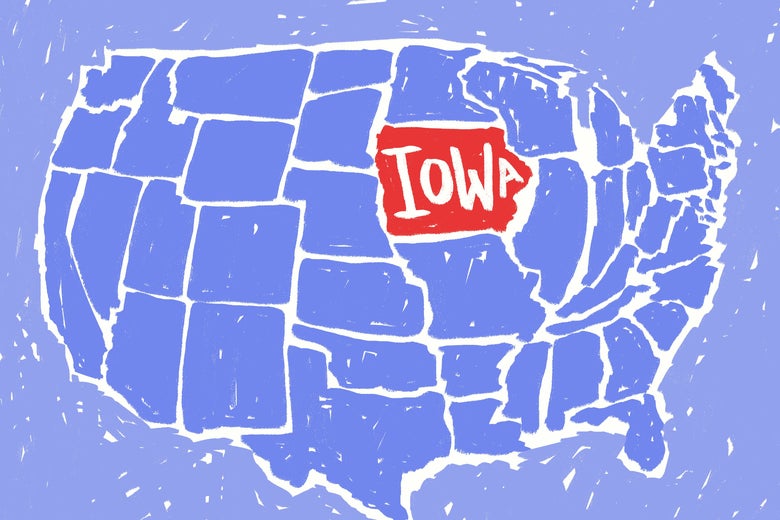
Illustration by Slate.
On this week’s Political Gabfest, Emily Bazelon, John Dickerson, and David Plotz discussed the current state of the Democratic presidential race going into the Feb. 3 Iowa caucuses—a conversation that ended with this debate about the fundamental unfairness of Iowa always going first. This transcript of their conversation has been edited and condensed for clarity.
David Plotz: Every time Iowa comes around, people ask if it’s useful to have this unusual caucus format, where effectively there’s a form of ranked-choice voting because supporters of candidates who get less than 15 percent can shift their allegiance to another candidate, where everyone has to gather and spend an evening together, making it hard to vote and taking up lots of time. And then there’s the question of whether Iowa is the right state to start anything in—it’s so rural, it’s so white.
I go back and forth. Part of me thinks this is a great way to start the campaign, because it’s such a test of enthusiasm, of organizing ability, of regional campaigning. You get higher-information voters who are willing to participate, and that sends a signal to the country: The higher-information people really feel like this guy or this woman is the best candidate. That seems good. It would be better if they did this in Michigan or Georgia than in Iowa, but in general, I’m slightly in favor, despite myself.
Emily Bazelon: I come down really hard on the other side. It’s infuriating that Iowa plays this role, because it’s so white and rural, but it’s also infuriating that the same state plays it every time.
I am so tired of not having my vote count. There is nothing better about the people in Iowa and New Hampshire than the rest of us. We should get our turn, or they should do it on the same day, or something. It’s so drastically unfair.
Plotz: Why don’t they rotate it? Why is it that Iowa, New Hampshire, and now Nevada and South Carolina get this lock?
John Dickerson: It’s a complicated historical thing, but it goes back to local parties and their traditions. If you’re running for office, and you think you’ve got a chance in Iowa, you suck up to the party, and you want Iowa to be the first. Also, you’ve been campaigning for other candidates in Iowa for years, and you’ve been building up chips with the game as it is now played; you’ve banked a lot.
I think it would be great if every time they just picked a new state, because there’s a lot of built-in stuff in these states that leads to patterns of behavior that you would want to shake up. You wouldn’t want the local poohbah, who’s really important, to have that much power. You’d want a new poohbah, who had to be freshly convinced.
Plotz: Everyone knows this. Why doesn’t some candidate who everyone knows is going to be a strong candidate say, we’re going to shake it up and we’re going to do it in California first.
Dickerson: John McCain tried a version of that when he didn’t play in Iowa and was nominated to the party by playing in New Hampshire. Others have tried that. There’s not a strong enough candidate to change the system. Also, once you get strong enough, you’d have to be president, and then you’ve got other stuff to worry about.
It would require the electorate to force the Democratic Party to do this. You’d have to have the reform bubble up through the Democratic Party systems, which is how the superdelegates got watered down.
Also, people could just not put so much weight on Iowa. When somebody scores first in basketball, people don’t leave the stadium. They expect a contest in which people shoot additional baskets, and then at the end of the game there’s a score.
Bazelon: I want to go back to your affection for the caucuses, David. It’s a terrible idea to up the cost of participating in democracy. You end up with a smaller group of people and, sure, they’re committed and they’re high-information, but what we should have is a democracy that lowers the barriers so that we hear from as many people as possible.
There’s lots of research from cities that shows that when you have neighborhood groups, local zoning meetings, the people who come are the loudest people, the retirees, the people with time. A political scientist crunched a ton of data in New York state, and it showed that these were people who are older and whiter and more conservative than the communities they came from. And they had a lock on the local process because they were showing up to these meetings. That should not be the test. That should not be what decides policy.
To listen to the full episode, in which the Gabfest hosts also discussed the Senate impeachment trial and an important Supreme Court ruling from earlier this week, click the player below or subscribe wherever you get your podcasts.
Readers like you make our work possible. Help us continue to provide the reporting, commentary and criticism you won’t find anywhere else.
Join Slate Plusfrom Slate Magazine https://ift.tt/31bGy8N
via IFTTT
沒有留言:
張貼留言